Mahershala Ali Moonlight
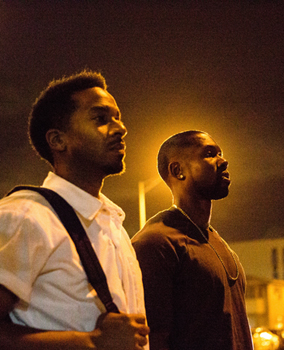
Mahershala Ali Moonlight
Cast: Mahershala Ali, Shariff Earp, Duan Sanderson
Director: Barry Jenkins
Genre: Drama
Rated: M
Running Time: 111 minutes
Synopsis: A timeless story of human connection and self-discovery, Moonlight chronicles the life of a young black man from childhood to adulthood as he struggles to find his place in the world while growing up in a rough neighborhood of Miami.
At once a vital portrait of contemporary African American life and an intensely personal and poetic meditation on identity, family, friendship, and love, Moonlight is a groundbreaking piece of cinema that reverberates with deep compassion and universal truths. Anchored by extraordinary performances from a tremendous ensemble cast, Jenkins's staggering, singular vision is profoundly moving in its portrayal of the moments, people, and unknowable forces that shape our lives and make us who we are.
Moonlight
Release Date: January 26th, 2017
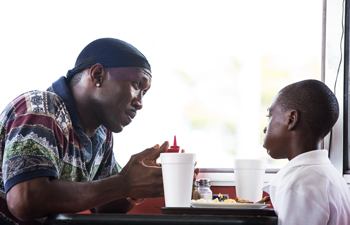 About The Production
About The Production
Arriving eight years after his critically acclaimed romance Medicine For Melancholy, writer-director Barry Jenkins returns with another deeply felt cinematic swoon, following one young man's tumultuous coming age in South Florida over the course of two decades. An unforgettable drama at the intersection of race, sexuality, masculinity, identity, family, and love, Moonlight establishes Jenkins as a major American filmmaker for his ability to capture the pure feeling of longing and heartache playing out over the years.
Featuring a trio of gifted actors (Alex Hibbert, Ashton Sanders, and Trevante Rhodes) inhabiting a single character during three phases of his life, Moonlight tells the story of one young man's coming of age in a tough Miami neighbourhood. As Chiron grows from an uncertain and tentative boy into a bullied teenager grappling with his sexuality and finally into a grown man, Jenkins skillfully shows through three distinct chapters a life in full, revealing how the powerful moments in each of our lives coalesce to shape our identities and define our fates.
Moonlight also features a stunning supporting ensemble, including Naomie Harris (Spectre, Mandela: Long Walk To Freedom, Pirates Of The Caribbean: At World's End) " playing with tough, impassioned grace a crack-addicted single mother trying to raise her young son amid tempestuous personal struggles " and a trio of soulful performances from Janelle Monáe (making her feature debut) André Holland (Selma, 42, 'The Knick") and Mahershala Ali (a recent Emmy nominee for 'House of Cards" and one of the stars of Netflix's upcoming 'Marvel's Luke Cage"), embodying the indelible mentors who help love and nurture Chiron across the turbulent years.
The Roots Of Moonlight
Moonlight was conceived in drama school as a class project by the esteemed playwright and Miami native Tarell Alvin McCraney, a MacArthur genius grant recipient in 2013 and a member of the Steppenwolf Theater Company in Chicago, whose 'Brother/Sister" trilogy of plays set in a Louisiana housing project placed him in the front rank of playwrights writing on the African American experience. He submitted the short work " titled 'In Moonlight Black Boys Look Blue" " to the Borscht Film Festival in Miami, dedicated to showcasing works by regional artists forging the cinematic identity of Miami through stories that 'go beyond the typical portrayal of a beautiful but vapid party town." Heading off to London for a writing residency with the Royal Shakespeare Company, Tarell Alvin McCraney all but forgot about the piece.
In 2013, producer Adele Romanski (Morris From America, The Myth Of The American Sleepover) was helping Jenkins sift through feature film projects for his eagerly anticipated follow-up to Medicine For Melancholy. The duo, friends since college, began holding bi-weekly meetings where they volleyed ideas back and forth until a dozen solid ideas took shape. One of them was Tarell Alvin McCraney's evocation of his own Miami youth, which had fallen into Barry Jenkins' hands through a Borscht collective member. 'Tarell Alvin McCraney did a great job of capturing what it felt like to be a poor black kid growing up in the Miami projects," Jenkins explains. 'I saw it as an opportunity to get some of my own childhood memories out of my head and onto the screen, filtered through Tarell Alvin McCraney's wonderful voice. The root of his experience was also the root of my experience " it was the perfect marriage."
By coincidence Barry Jenkins came of age in the same rough and tumble Liberty City housing projects where Tarell Alvin McCraney grew up, and where much of Moonlight the film unfolds. He also contributed work to the Borscht Film Festival " Barry Jenkins' 2013 short film 'Chlorophyl" was a sprawling 17-minute evocation of his native Miami emphasising changes wrought through urban renewal. The short film incorporated some of the same themes as Medicine For Melancholy, including displacement, gentrification and yearning for love and connection amid urban anomie.
Barry Jenkins and Tarell Alvin McCraney did not know each other as children but their formative years were remarkably similar. They attended the same elementary and middle schools (despite a difference in age) and both went on to become artists, treating subjects and themes close to their own experiences, including themes of identity and masculinity. Most notably, both grew up in households in which their mothers grappled with severe drug addiction. Jenkins' mother survived her battle and has remained HIV positive for 24 years, while Tarell Alvin McCraney's mother ultimately succumbed from AIDS as a result of her struggles.
Tarell Alvin McCraney's original piece was rooted in the relationship between a young Liberty City boy and a local drug dealer, who becomes a kind of surrogate father as the boy contends with bullying, his mother's addiction, and a pervasive feeling of loneliness and otherness that ultimately ends in tragedy. Jumping back and forth between youth and adolescence, yet deeply rooted in themes of masculinity, identity, and community, the non-linear 'In Moonlight Black Boys Look Blue" examined the burgeoning gay sexuality of its protagonist Chiron coming of age in a challenging milieu. 'It was important to me to show from the beginning how the community is active in Chiron's life," Tarell Alvin McCraney says. 'The community knows things about him before he knows them about himself. People want to place him in a category before he even understands what that means. This happens to all of us, whether we're male, female, black, white, straight or gay. There are moments when our community decides to tell us what they see us as. How we respond to that makes our struggle very real, and deeply influences how our lives unfold."
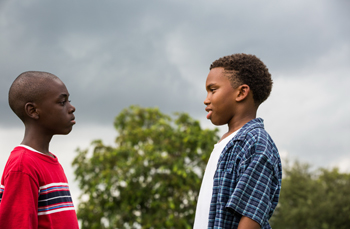 For his adaptation, Barry Jenkins set about broadening the story's three chapters, expanding on an adult interlude in Chiron's life that was a mere phone call in Tarell Alvin McCraney's source material, and giving equal shrift to three distinct eras in his young protagonist's journey from childhood to adulthood. Moonlight opens with Chiron at age 10 (nicknamed Little in the movie), fleeing from bullies in his housing project until he is rescued by the drug dealer Juan, who becomes his mentor and unofficial guardian with the help of his saintly girlfriend Teresa. In the second chapter, Chiron grapples with young love in the form of his teenage schoolmate Kevin, the declining state of his mother Paula and a traumatic schoolyard incident that changes the course of his life. The third chapter follows Chiron in adulthood " now known by his street name Black " contending with the thwarted love that has hindered his identity through his inability to express his feelings. In a virtuoso sequence set in a Miami diner, Chiron reunites with Kevin in a thoroughly unforgettable and unexpected way.
For his adaptation, Barry Jenkins set about broadening the story's three chapters, expanding on an adult interlude in Chiron's life that was a mere phone call in Tarell Alvin McCraney's source material, and giving equal shrift to three distinct eras in his young protagonist's journey from childhood to adulthood. Moonlight opens with Chiron at age 10 (nicknamed Little in the movie), fleeing from bullies in his housing project until he is rescued by the drug dealer Juan, who becomes his mentor and unofficial guardian with the help of his saintly girlfriend Teresa. In the second chapter, Chiron grapples with young love in the form of his teenage schoolmate Kevin, the declining state of his mother Paula and a traumatic schoolyard incident that changes the course of his life. The third chapter follows Chiron in adulthood " now known by his street name Black " contending with the thwarted love that has hindered his identity through his inability to express his feelings. In a virtuoso sequence set in a Miami diner, Chiron reunites with Kevin in a thoroughly unforgettable and unexpected way. After reading Barry Jenkins' adaptation, Adele Romanski was immediately captivated by the script's highly emotional take on coming of age under fire. Although Moonlight is set in a very specific place, its themes apply to anyone who has ever felt out of place in the world. 'The script broke my heart," Adele Romanski shares. 'Chiron's story was something I could identify with even as a white female. A lot of people across race, gender, age, and sexuality can identify with feeling -other.' While Moonlight is in essence a gay, black coming of age drama, the core of its story is the universality of its otherness."
One of the most powerful aspects of Moonlight is that it was conceived in cinematic form by a straight man working from material rooted in the personal experiences of an openly gay man " yet the film's sexuality is not its centerpiece or defining feature, owing to Barry Jenkins' penchant for subtlety and introspection over telegraphed moments or sermonizing. Ultimately, Moonlight transcends labels and definitions, telling a universal story through one young man's cathartic personal struggles. 'Barry Jenkins is a very introverted and private person," Adele Romanski explains. 'He doesn't show much of himself outside a core group of people he trusts. Moonlight allowed him to tell a story that is unique to his own upbringing and history " yet he was able to access it through an adapted work that was Tarell Alvin McCraney's story."
Producers Jeremy Kleiner and Dede Gardner, Co-Presidents of Brad Pitt's Plan B Entertainment, had been fans of Barry Jenkins since Medicine For Melancholy, which both praise for its emotionally rich complexity and luminous cinematic beauty. The Plan B executives started their relationship with Barry Jenkins soon after the release of Medicine For Melancholy, but it was at the 2013 Telluride Film Festival that their collaboration on this project began to firmly take root. Plan B was premiering 12 Years A Slave at the festival, and coincidentally Barry Jenkins was the moderator at a post-screening Q&A with that film's director, Steve McQueen. After spending time together in Telluride, Jeremy Kleiner, Dede Gardner, and Barry Jenkins renewed discussions about working together, leading to Jenkins and Adele Romanski bringing Plan B the script to Moonlight when they decided that it would be their next project.
Jeremy Kleiner and Dede Gardner were deeply moved by what they read. 'The writing was incredibly beautiful and like its predecessor possessed a notable elegance and simplicity in its structure," Jeremy Kleiner shares. 'Barry Jenkins has the remarkable ability to create and capture intimate spaces between characters " specifically two characters. He penetrates interior emotional states in a way you don't see coming and suddenly you're in the depths of the human heart." Adds Dede Gardner: 'Barry Jenkins is someone who believes that whole worlds collide in the space of one conversation. It takes a skilful writer-director to bring that alive on the screen." Plan B signed on shortly after reading, and financing on Moonlight was completed in early 2015, when A24 made their first foray into production and got behind the project.
BUILDING THE CAST
Casting Moonlight began with Barry Jenkins' bold decision to show Chiron's progression during various stages of his young life beginning at age ten and extending into his early 30s, without aging a single actor through the course of the film's three chapters. This considerable challenge required the casting team to find three distinct actors who could convey the same inner feeling across multiple years without ever meeting during the course of filming. To bring Chiron to life in triplicate, Barry Jenkins turned to Los Angeles-based casting director Yesi Ramirez (Gemini, The Loner), who also hails from Miami. In a previous career, Yesi Ramirez was studying to be a juvenile public defender and worked frequently with at-risk children in Florida, lending her insight into troubled youth. 'That's what pulled me into the script," Yesi Ramirez comments. 'Chiron needed someone to help him along in life. I've known these kids. I've worked with them."
The filmmakers knew from the start that whoever played Little needed to be a Miami local. Barry Jenkins and Adele Romanski combed the streets of the city posting casting notices and going into schools and neighbourhoods in search of a young man who could embody this crucial role. Ultimately they discovered Hibbert and put him on tape for others to see; when Yesi Ramirez viewed the audition she was immediately impressed by the quiet curiosity and intense vulnerability that manifested itself in his very young eyes. Everyone felt confident that he was the one.
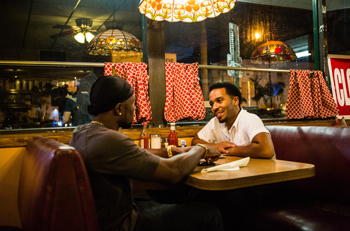 For Chiron at age 16, Yesi Ramirez scouted teenagers all over the country, reviewing audition tapes and headshots and scanning the Internet for video clips of students who were graduating from high school performing arts programs. In the end the filmmakers chose Ashton Sanders, who Ramirez first discovered during one of her numerous Los Angeles casting sessions. Ashton Sanders had appeared in a previous independent film and had a brief role in Straight Outta Compton, but he stood out for his stillness and impassivity, crucial attributes for Chiron in the film's second chapter.
For Chiron at age 16, Yesi Ramirez scouted teenagers all over the country, reviewing audition tapes and headshots and scanning the Internet for video clips of students who were graduating from high school performing arts programs. In the end the filmmakers chose Ashton Sanders, who Ramirez first discovered during one of her numerous Los Angeles casting sessions. Ashton Sanders had appeared in a previous independent film and had a brief role in Straight Outta Compton, but he stood out for his stillness and impassivity, crucial attributes for Chiron in the film's second chapter. Trevante Rhodes, a former track and field star from Louisiana who was discovered by a casting agent on his Texas college campus and immediately cast in a Nicolas Cage film, had originally read for the role of the adult Kevin in the film's evocative third chapter. But his reading was interrupted by the casting team, including Ramirez, Jenkins and Romanski, when it dawned on everyone at once that the muscular, intensely masculine Rhodes was more suited for the role of Black, Chiron's street-savvy adult incarnation. Like a lightning bolt, the relatively unknown actor shot into a lead role that required him to carry the weight of all three Chirons. 'It's not often as a casting director that I feel so strongly about an actor just by him walking in the room, but Trevante Rhodes was special," Yesi Ramirez recounts. 'In addition to his masculinity, he possessed that vulnerability we needed so crucially for the audience to feel something for this character."
In a feat of serendipitous casting, the three Chirons connect seamlessly across the three chapters despite the fact that Hibbert, Sanders and Rhodes don't entirely resemble one another, and never met during filming. 'We got lucky because we found the best actors for each part," Yesi Ramirez says. 'But they also had the common thread that pulled the three different stages together, which was an intense vulnerability. Each actor could express it in his eyes, helping to create a complete picture of this character's life." Adds Barry Jenkins: 'You don't see black males on screen where they're just allowed to emote instead of talking or being active all the time. All three actors were great at emoting."
For Trevante Rhodes, the biggest challenge inhabiting Chiron as an adult came in staying true to the character's deeply concealed emotional core despite physical 'armor" like muscles and grills, and a decidedly opaque street name. 'Black is an introverted, troubled man who is hiding his true self from the world because he's frightened of letting people know who he really is," explains Trevante Rhodes. 'The title Moonlight refers to shining light in the darkness or illuminating things you're afraid to show. Everybody in life has had a struggle like Chiron's at some point, whether it's for a short period of time or an entire lifetime. Anyone who insists they haven't put up a façade is living in some kind of darkness."
At its heart, Moonlight is a story about masculinity and how it's expressed in a specific community like the Liberty City housing project in Miami, where much of the movie was filmed. In this milieu, criminal life routinely overlaps with everyday domestic life and paternal figures come to take on the ambiguous qualities of provider and supplier. In the case of Juan, the local drug dealer who takes Chiron under his wing while quietly supplying his mother with crack cocaine, the role required an actor who appeared ferocious on the surface but harboured kindness and nurturing underneath. 'There are so many different layers to a character like Juan," Barry Jenkins explains. 'I'm examining black masculinity in this movie, but on a deeper level I'm exploring inner city impoverished black masculinity. We needed someone who could be menacing one moment and extremely caring the next."
The filmmakers found their Juan in the Oakland-born stage and screen actor Mahershala Ali, whose most visible role to date is playing the lobbyist and former press secretary Remy Danton on Netflix's 'House of Cards," and whose other works include this year's Free State Of Jones, The Hunger Games: Mockingjay and Netflix's forthcoming 'Marvel's Luke Cage" series. Adele Romanski had just finished working with Mahershala Ali on another production, Justin Tipping's KICKS, and had been deeply impressed with his work; while filming she thought of him for the role of Juan, and mentioned to him she had a project she was hoping to share with him as soon as it was ready.
In a brief yet astonishing performance, Mahershala Ali in the guise of Juan imparts valuable information to Chiron that helps him survive inside and out through the years " until he comes to embody a version of Juan in his adult life. 'He's the father figure to Little, which is important because you want to feel like Little has someone guiding him through life," Yesi Ramirez explains. 'There's also this dangerous level to Juan, which isn't what you associate with paternal figures. Mahershala Ali is a very intense, emotional actor, but he also has this ability to comfort."
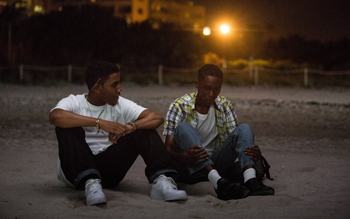 Showing a different side of masculinity in the quietly explosive third chapter of Moonlight is the actor André Holland ('The Knick," Selma, 42), whose luminous and serene performance as the adult Kevin brings a sense of comfort and ease that ultimately helps Chiron emerge from his shell. Early in the casting process Holland " who has appeared in several of Tarell Alvin McCraney's plays, including the Brother/Sister trilogy " was considered for the role of Juan. But the multi-faceted stage and screen actor submitted an audition tape as Kevin that reduced the casting team to tears, making it instantly clear where the performer's strengths were best utilised. 'André Holland is so comfortable in his skin as an actor, signaling a way out for Chiron through his openness and giving nature," Barry Jenkins explains. 'Black is thrown a lifeline by the one person he's allowed himself to be intimate with, and through André's soulfulness, he attains a kind of freedom. Kevin is saying to his old friend, I'm not going to push you, I'm not going to force you, I'm just going to offer you this light..."
Showing a different side of masculinity in the quietly explosive third chapter of Moonlight is the actor André Holland ('The Knick," Selma, 42), whose luminous and serene performance as the adult Kevin brings a sense of comfort and ease that ultimately helps Chiron emerge from his shell. Early in the casting process Holland " who has appeared in several of Tarell Alvin McCraney's plays, including the Brother/Sister trilogy " was considered for the role of Juan. But the multi-faceted stage and screen actor submitted an audition tape as Kevin that reduced the casting team to tears, making it instantly clear where the performer's strengths were best utilised. 'André Holland is so comfortable in his skin as an actor, signaling a way out for Chiron through his openness and giving nature," Barry Jenkins explains. 'Black is thrown a lifeline by the one person he's allowed himself to be intimate with, and through André's soulfulness, he attains a kind of freedom. Kevin is saying to his old friend, I'm not going to push you, I'm not going to force you, I'm just going to offer you this light..." The last of the male actors to be cast in Moonlight proved to be the most difficult, owing to the frank sexuality depicted in the film's second chapter between teenage friends Kevin " who is more experienced " and Chiron, who is only beginning to grapple with his sexuality. Yesi Ramirez auditioned hundreds of actors for the promiscuous, freewheeling Kevin, considering rappers, musicians, up-and-coming actors and non-professionals alike, with no Kevin in sight. Nearing production, in a state of desperation, she turned to the Internet and found upstart actor Jharrel Jerome in the theater program of LaGuardia High School of the Performing Arts in New York City, where he was just graduating. 'A lot of great actors come out of that school and he had already turned 18," Yesi Ramirez explains. 'It was a relief to find someone we really liked instead of having to settle."
Two Very Different Maternal Figures
Balancing out the masculinity on display in Moonlight is a pair of roles by women that are disparate yet similar, encompassing different sides of motherhood and brought to life with unifying passion by a big-screen newcomer and a seasoned professional. British actress Naomie Harris plays Chiron's mother Paula during three stages in a frenzied life ravaged by drug addiction. In the first chapter, Paula is a seemingly overprotective single mother who tries to shield her son from the local drug dealer Juan. In the second chapter, she is a full-fledged addict, neglecting Chiron's needs in the service of her next fix. In the final chapter, she reconciles with the adult Chiron after years of estrangement.
Naomie Harris had hovered on Yesi Ramirez's casting radar since the early 2000's, when the actress drew raves for her visceral work in Danny Boyle's 28 Days Later, a role that required both physical and emotional expression. 'I've never watched any of her movies thinking that's Naomie Harris simply playing a role," Yesi Ramirez comments. 'She truly embodies every character she plays, whether it's a detective in After The Sunset or a seafaring goddess in the Pirates Of The Caribbean movies. That quality was important for Paula because you have to believe this woman is going through these struggles " and at the same time sympathise with her because she's a single working mother with a young son."
For Naomie Harris, a Cambridge-educated actress who doesn't drink, smoke or use drugs, it was an emotionally wrenching experience to immerse herself into such a troubled and complex character. 'I had to make up a lot of her story in my mind to bring her to life," Naomie Harris says. 'Paula is a working woman who isn't just dabbling in drugs. She's severely addicted and over time becomes a crack addict. She constantly chooses her addiction over her own son. One of the most important things in playing any character is learning to empathise with her. You have to find a deep connection and understanding for the choices made by someone like Paula in order to bring her thoroughly and effectively to life."
Naomie Harris prepared for the role by studying the lives and mannerisms of drug addicts from the era of Barry Jenkins' and Tarell Alvin McCraney's childhood, when crack use in the United States was at its apex. Many of the addicts were women who also dabbled in prostitution or had experienced sexual abuse. 'They used drugs to numb themselves against the deep emotional wounds and trauma they'd been through," Naomie Harris explains. 'You could see how much the drugs transformed them, and how the real person inside became deeply hidden. I found it much easier to empathise with Paula when I could see her as someone locked deep within herself."
In contrast to Paula's frequently agitated state is the quietly serene, almost saintly Teresa, Juan's live-in girlfriend who becomes a surrogate mother to Chiron during his formative years. Casting Teresa was another challenge for Yesi Ramirez, who adhered to the script and began looking for Latina actors to fill what was originally written to be a Cuban-American character. 'We also thought this would be a great opportunity for someone to come in and play a role that was unexpected," Yesi Ramirez explains. Producer Jeremy Kleiner urged the casting team to consider someone outside the box, in keeping with the film's defiantly uncategorisable nature. Yesi Ramirez put together an extensive list of unconventional choices, and having looked to the music world to fill other roles thought of Janelle Monáe.
An incandescent R&B performer who is frequently compared to James Brown, Janelle Monáe showed a different side of her kinetic stage persona after she read for Yesi Ramirez on another project. 'She surprised me," Yesi Ramirez says. 'She was so emotional, and had this terrific range." The casting team was impressed by the chameleonic singer's ability to convey quiet and subdued " not to mention nurturing. 'It was so important for Teresa to feel maternal and calming," Yesi Ramirez adds. 'Because Paula doesn't fulfill that role for Chiron."
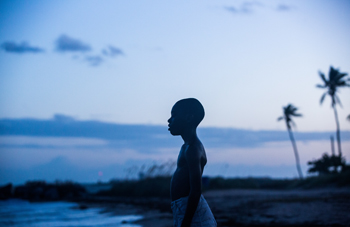 MIAMI PLAYS ITSELF
MIAMI PLAYS ITSELFMoonlight also exudes an indelible sense of place, shining its rays on the city of Miami and becoming a distinct character in its own right, much in the same way San Francisco came alive in Barry Jenkins' previous feature Medicine For Melancholy. Many of the people involved with the film, including Barry Jenkins, Tarell Alvin McCraney, Adele Romanski and Rodriguez, are Florida natives. Each of them has been affected and shaped by Miami in different ways.
For Tarell Alvin McCraney, the city is a place unlike any other for the way it engulfs and suspends its inhabitants and visitors in a lush embrace. 'It's the only place I understand yet can't quite fully explain," Tarell Alvin McCraney notes. 'Miami is inundated with American problems but feels otherworldly because it's a paradise most of the time. It's hard to think of our 9-to-5 routines when it's hot and warm with palm trees swaying all around you. There's also something timeless about the city, and that's what Moonlight captures. You experience a cross-section of what Miami truly feels like, without skimping on the fullness of the place."
For Yesi Ramirez, it's the city's unique people that stand out most and give the metropolitan area " and Moonlight " its unique flavour. 'People in Miami are such distinct characters," Yesi Ramirez explains. 'I have vivid memories growing up around so many diverse people and personalities. It's a welcoming and comforting environment even if you're a stranger there. Especially when you find common ground with someone."
For Adele Romanski, who calls Miami 'a hugely important character in the movie," the South Florida light remains one of the city's most palpable characteristics, bathing the story in its distinct glow. 'Miami light is typically perceived to be harsh because there's so much direct sunlight," Adele Romanski explains. 'But the humidity and moisture in the air gives it this incredible texture. Combined with the lushness of the surrounding environment, the light becomes achingly beautiful. You can feel it."
The Look Of Moonlight
Cinematographer James Laxton (CAmp X-Ray, The Myth Of The American Sleepover), who attended film school with Barry Jenkins at Florida State University and later shot Medicine For Melancholy, quickly became enchanted with Miami, warming to its distinctive people, architecture, colour schemes, languages, and atmospheric texture, many of which came to influence Moonlight's intoxicating visual style. 'Miami is like a thousand different worlds colliding," James Laxton explains. 'The Caribbean and Cuban influences mix with Southern American traditions; wealthy people share space with impoverished people; even the vibrant colours used to paint homes and buildings are unique to the city. In addition, the tropical weather creates an agricultural climate where there is green almost everywhere " it's almost fluorescent."
Barry Jenkins knew early on that he wanted to shoot his second feature in Cinemascope, turning to frequent collaborator James Laxton to bring to life in the widescreen format the people and places that made Moonlight an emotional powerhouse on the page. 'We had a saying between us during filming " this isn't neorealism," Barry Jenkins explains. 'The story is grounded, but it's also heightened in many ways. For us the movie is more like a fever dream." Through the film's lush cinematography, James Laxton finds arresting visual poetry in the emotive faces of the film's powerhouse cast and a sumptuous urban backdrop that couldn't be further removed from Scarface or Miami Vice. He creates wide tableaus around the film's subjects to suggest the opposite of claustrophobia or restriction " instead, actors feel like they are set adrift in the streets and neighborhoods of a city Jenkins lovingly describes as a flat, wide, endless sprawl with unobstructed views of the sky. 'We wanted Moonlight to feel immersive," Barry Jenkins adds. 'Characters often look directly at the viewer, suggesting you are there with them in Miami."
Filming In Liberty Square
Barry Jenkins and his crew shot Moonlight in an area of Miami known as Liberty Square, part of the greater Liberty City public housing scheme inhabited by Paula and Chiron during the second chapter of the movie. The neighbourhood is frequently cited as among the most dangerous in America, having appeared in numerous episodes of the documentary crime series 'The First 48" and in the lyrics of hardcore rap combo the 2 Live Crew, whose members came of age in nearby projects. 'We wanted to tell an authentic story so we went into neighbourhoods and used locations that felt authentic to our characters' lives," Adele Romanski notes. 'For some of our crew, it was their first time working in a tough neighbourhood, even those crewmembers who had lived in Miami for decades."
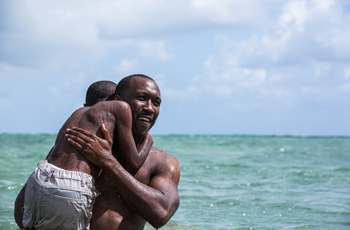 For Barry Jenkins, a Liberty City native who left Miami after college to settle on the West Coast, it was important to bring alive the beauty of the surroundings that shaped him as a youth, much in the same way they shape Chiron's upbringing in the movie. 'Liberty City is one of Miami's most depressed areas, but what you see in the film is its explosive colours," Barry Jenkins says. 'All the buildings are vibrant in beautiful blue, pink and orange pastels. They haven't been painted in 40 years, but the colour is still there." Moonlight is at times a heavy movie, one that deals with serious issues, but I wanted to capture the unexpected vibrancy of those projects " and how it feels for that Miami light and colour to pass through your retina."
For Barry Jenkins, a Liberty City native who left Miami after college to settle on the West Coast, it was important to bring alive the beauty of the surroundings that shaped him as a youth, much in the same way they shape Chiron's upbringing in the movie. 'Liberty City is one of Miami's most depressed areas, but what you see in the film is its explosive colours," Barry Jenkins says. 'All the buildings are vibrant in beautiful blue, pink and orange pastels. They haven't been painted in 40 years, but the colour is still there." Moonlight is at times a heavy movie, one that deals with serious issues, but I wanted to capture the unexpected vibrancy of those projects " and how it feels for that Miami light and colour to pass through your retina." For James Laxton, who grew up in the San Francisco Bay Area before moving to Florida to attend college, filming in and around Liberty Square was an inspirational experience, with local residents going out of their way to welcome the production. 'The people living in that community see a lifetime in ten years in terms of the struggles they face on a daily basis," James Laxton says. 'What we try and show in Moonlight is the strength of those communities. It's a different side of a place most of us have only seen on the evening news in connection with violence or tragedy."
The Music Of Moonlight
Moonlight also comes alive through its music, which composer Nicholas Britell (The Big Short) began writing even before he saw a cut of the movie. Upon reading the script for the first time, Nicholas Britell was impressed by Barry Jenkins' penchant for lyricism. 'There's true poetry in the way Barry conceived this movie," Nicholas Britell suggests. 'There is beauty, intimacy, tenderness and sensitivity to many of the scenes in his script." He set about capturing these feelings musically, producing an early piece " -Chiron's Theme' " that became the bedrock of the score, with piano alternating between major and minor chords. 'On top of this, a sparse violin plays in counterpoint," he continues. 'I wanted the harmonies to feel like they were subtly exploring emotions at the same time, much like Chiron explores his emotions over the course of the story."
But this was only the beginning of a long collaborative process between writer-director and composer that went beyond conventional film scoring. After filming was complete, Nicholas Britell and Barry Jenkins met over the course of several months in the composer's Lincoln Center studio in New York City to experiment with different and unconventional musical possibilities for the score. 'Barry is truly passionate about music and has an immediate instinct for how music works with images," Nicholas Britell explains. 'We would watch scenes from the movie and explore different musical textures, sounds and ideas. When an idea clicks, you see how it changes your perception of a scene. You really come to feel it."
Both Nicholas Britell and Barry Jenkins are passionate about hip-hop music, and Nicholas Britell was once a keyboardist in a hip-hop band. After Barry Jenkins introduced him to the Southern strain of hip-hop known as Chopped and Screwed, Nicholas Britell set about working the sounds into his own compositions, bending and deepening the existing musical score. 'For me, the beauty of hip-hop is the unique sounds that result from sampling records and bending the audio, either through raising or lowering the pitch or increasing or decreasing the tempo of songs," Nicholas Britell explains. 'In Chopped and Screwed music, the -bending' is really the key " songs are often slowed way down, and the pitch goes down too, so the whole character of a song changes."
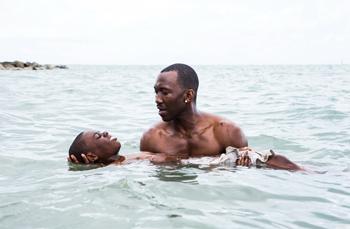 After finishing his compositions, Nicholas Britell chopped and screwed them, taking cello pieces and turning them into strange bass-like rumblings and bending piano and violin music into wholly new sonic shapes. One notable example of this process occurs in the schoolyard fight scene during Moonlight's transformative second chapter. The musical score is 'Chiron's Theme" slowed down to such an extent that it sounds more like ominous thunder than any conventional theme. Explains Nicholas Britell: 'It had the powerful effect of musically capturing the way in which Chiron's world was being turned upside down, distorted into a new shape."
After finishing his compositions, Nicholas Britell chopped and screwed them, taking cello pieces and turning them into strange bass-like rumblings and bending piano and violin music into wholly new sonic shapes. One notable example of this process occurs in the schoolyard fight scene during Moonlight's transformative second chapter. The musical score is 'Chiron's Theme" slowed down to such an extent that it sounds more like ominous thunder than any conventional theme. Explains Nicholas Britell: 'It had the powerful effect of musically capturing the way in which Chiron's world was being turned upside down, distorted into a new shape." The music changes with each of Chiron's incarnations, ultimately unifying the film's separate chapters through its propulsive, metamorphic force. 'When I hear Nicholas Britell's score, I see the movie," Barry Jenkins comments. 'He absolutely nailed what this movie feels like. Listening to his work, I envision a 1974 Chevrolet Impala on 28-inch rims drifting down MLK Boulevard blasting Bach, chopped and screwed, all across Liberty Square."
Ultimately, Moonlight is a universal story of love, family and reconciliation, which through its electrifying atmosphere comes to liberate anyone who has ever felt distinct or apart, or has felt trapped inside their own emotions, yearning for change. Sums up Barry Jenkins: 'This is an immersive, experiential film in which characters over time negotiate what they will allow themselves to feel. What they project back to the world with those feelings becomes the universal process of claiming one's identity. It's amazing to watch someone yearn for something internally but not have the courage to express it." Moonlight is an expression of that yearning.
Moonlight
Release Date: January 26th, 2017
MORE
- Mission: Impossible Fallout
- Glenn Close The Wife
- Allison Chhorn Stanley's Mouth Interview
- Benicio Del Toro Sicario: Day of the Soldado
- Dame Judi Dench Tea With The Dames
- Sandra Bullock Ocean's 8
- Chris Pratt Jurassic World: Fallen Kingdom
- Claudia Sangiorgi Dalimore and Michelle Grace...
- Rachel McAdams Disobedience Interview
- Sebastián Lelio and Alessandro Nivola...
- Perri Cummings Trench Interview



